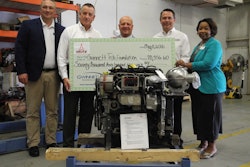Navistar International Corporation has announced second quarter 2016 net income of $4 million, or $0.05 per diluted share, compared to a second quarter 2015 net loss of $64 million, or $0.78 per diluted share.
Revenues in the quarter were $2.2 billion, down 18% compared to $2.7 billion in the second quarter last year. The decline reflects lower volumes in the company's core U.S. and Canadian markets, due to softer industry conditions and the discontinuation of the company's Blue Diamond Truck (BDT) joint venture in mid-2015, as well as lower engine volumes in Brazil, due to ongoing weak economic conditions in that country. This was partially offset by higher sales in the company's Parts segment.
Second quarter 2016 EBITDA was $135 million, compared to second quarter 2015 EBITDA of $85 million. This year's second quarter results included $52 million in adjustments, including $46 million to pre-existing warranty reserves. As a result, second quarter adjusted EBITDA was $187 million, up 83%, compared to adjusted EBITDA of $102 million in the comparable period last year. The improvement was driven by continued strong cost management, product cost improvement and record Parts segment profitability.
"For the first time since we launched our turnaround more than three years ago, Navistar reported a quarterly profit," says Troy A. Clarke, Navistar President and Chief Executive Officer. "Our performance this quarter begins to demonstrate the earnings potential of this company. The fact that we earned a profit despite lower Class 8 truck volumes that impacted the entire industry, underscores the tremendous progress we continue to make in managing our costs effectively and improving our operations."
The company achieved $56 million in structural cost reductions during the second quarter. Year to date, structural cost reductions are at $113 million. When combined with material spend reductions and manufacturing savings, the company is on track to well exceed its total cost reduction goal of $200 million for 2016.
Navistar ended second quarter 2016 with $817 million in consolidated cash, cash equivalents and marketable securities. Manufacturing cash, cash equivalents and marketable securities were $732 million at the end of the quarter.
The company kicked off the second quarter with the launch of its new HX Series of premium vocational trucks. Orders for the HX Series, which is now in production, are already more than 70% of what the company expected for the fiscal year. Later in the quarter, the company announced it is adding the Cummins ISL 9-L engine as an option for its DuraStar and WorkStar models, further expanding its leadership in offering the most comprehensive powertrain options in the industry.
The company also made advances on its connected vehicle leadership during the quarter. OnCommand Connection, Navistar's open-architecture remote diagnostics service, surpassed the 200,000 subscriber mark. OnCommand Connection helps customers achieve significantly improved on-road uptime for their trucks and buses, regardless of make.
Navistar also launched the industry's first Over-the-Air Programming service, which enables drivers or fleet managers to utilize a mobile interface to initiate engine programming over a safe, secure Wi-Fi connection. This speeds customer access to updated engine calibrations that will deliver superior fuel efficiency and other benefits. Since the end of the quarter, Navistar also announced that it was the first truck OEM to offer Over-the-Air Programming with Cummins engines, including Cummins engines in vehicles not built by International.
For the second half of 2016, Navistar lowered its industry guidance range by 20,000 units, due to softening Class 8 market conditions. Given this, along with slower than anticipated market share growth domestically, weaker export markets, and the impact of a stronger dollar, the company reduced its full-year revenue and adjusted EBITDA guidance.
"While we were net income positive in the second quarter, it will now be difficult for us to be profitable for the entire year given the tougher than anticipated market conditions, primarily due to the lower outlook for Class 8 industry volumes," Clarke says. "We are confident we will generate and implement additional performance improvements to partially offset current industry conditions."
GUIDANCE
Industry
- Reduced its forecast of fiscal year 2016 retail deliveries of Class 6-8 trucks and buses in the United States and Canada to 330,000-360,000 units.
- Reduced its Class 8 market projection to 220,000-250,000 units.
- Maintained its projection that the medium, school bus and severe service segments will grow in 2016 versus 2015.
Navistar
- Revised 2016 revenue guidance downward to $8.2-$8.6 billion.
- Reduced 2016 adjusted EBITDA guidance to $550-$600 million.
- Updated total cost reduction guidance to well exceed $200 million.
- Reduced its end-of-year manufacturing cash guidance to be approximately $800 million.
Truck Segment – Truck segment net sales declined 25% to $1.5 billion in second quarter 2016 compared to second quarter 2015, due to lower core truck volumes as a result of softer industry conditions and the impact of a shift in product mix in its core markets. Truck chargeouts in the company's core market were down 15% year-over-year. Also, second quarter 2015 revenues included $122 million in Ford sales through the BDT joint venture, which ended May 1, 2015.
The Truck segment loss narrowed to $23 million in second quarter 2016 versus a second quarter 2015 loss of $51 million, driven by lower structural cost, improved mix, lower accelerated depreciation charges and other income, which were partially offset by higher year-over-year adjustments to pre-existing warranties and an increase in used truck reserves.
Parts Segment – Parts segment second quarter 2016 net sales were $647 million, up $34 million, or 6%, compared to second quarter 2015, driven by enhanced retail programs in the U.S. market, which was partially offset by unfavorable currency exchange rates and market pressures, primarily in Canada and Mexico.
The Parts segment recorded record quarterly profit of $176 million in second quarter 2016, up 32% versus the same period one year ago, primarily due to margin improvements and cost reduction initiatives.
Global Operations Segment – Global Operations segment second quarter 2016 net sales decreased 41% to $77 million compared to second quarter 2015. This was primarily driven by a decrease in South America engine operations, reflecting lower volumes and unfavorable movements in foreign currency exchange rates, as the average conversion rate of the Brazilian Real to the U.S. dollar weakened by 20% for the second quarter of 2016 compared to the same period last year. The continued economic downturn in the Brazil economy contributed to 46% lower engine volumes in the second quarter of 2016 compared to the comparable prior year period.
The Global Operations segment recorded a $1 million loss in second quarter 2016 compared to $1 million in profit in the same period one year ago. The slight year-over-year change was due to lower manufacturing and structural costs as a result of prior year restructuring and cost-reduction efforts, which was more than offset by a $10 million net gain in second quarter 2015 related to a customer dispute settlement.
Financial Services Segment – Financial Services segment second quarter 2016 net revenues decreased by $2 million, or 3% versus the same period one year ago, primarily driven by a decrease in the average retail notes receivable balances, partially offset by higher revenues from operating leases.
The Financial Services segment profit increased by $3 million, or 14% year-over-year in second quarter 2016, primarily due to an increase in gains on lease terminations, a decrease in the provision for loan losses, and cost reduction initiatives, partially offset by a decrease in revenue.

















